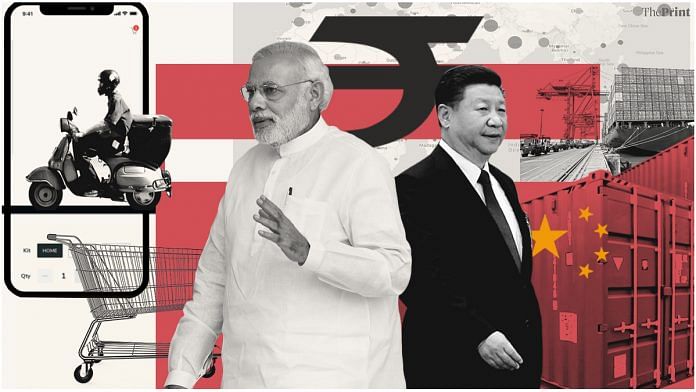The Centre revoked permission to e-commerce firms to sell and deliver non-essential items from Monday to ensure “level playing field” with small retailers amid the nationwide lockdown to curb Covid-19. India also issued new FDI rules to cut the risk of “opportunistic takeovers” by neighbouring countries. China has objected to the rules, calling it “discriminatory“.
ThePrint asks: E-commerce curbs and China FDI rules: Is Covid-19 making India more protectionist?
These decisions are nationalist, they shouldn’t be dismissed as protectionist
 Ashwani Mahajan
Ashwani Mahajan
National Co-Convener of Swadeshi Jagaran Manch
The whole world is wary of China because of their opportunistic attempts to take over companies that have seen a decline in share prices amid the coronavirus crisis. Every nation has a sovereign right to protect its interests and amend FDI rules. Why does ‘protectionism’ carry a negative connotation in the first place? Under the circumstances, this decision must be termed nationalist.
Many globalists have misinformed views about free trade and the pursuit of self-reliance. If a country wishes to protect itself from exploitation, especially during a global health crisis, then it has no choice. For example, China ruined our Active Pharmaceutical Ingredient (API) industry by selling goods in India at dirt cheap prices, putting domestic API producers out of business and making us dependent on China. Now, they’ve increased the price of APIs. Also, recently, tens of thousands of Covid-19 testing kits from China failed quality standards.
With regard to e-commerce curbs, Indian government has taken a judicious decision. And revoking permission to allow e-commerce companies to sell non-essential items post 20 April is aimed at establishing a level-playing field for retailers. At a time when MSMEs, traders and even kirana stores are suffering under the lockdown, it makes sense for the government to prohibit e-commerce companies from having an edge over domestic retailers. As it is, e-commerce companies were pulled up for flouting FDI rules.
India is becoming protectionist via e-commerce curbs and revised FDI rules with good reason.
With West hit hard by Covid, finding non-Chinese dollars will be tough for Indian startups
 Prasanto K Roy
Prasanto K Roy
Policy consultant and tech writer
Covid-19 is the new 26/11, multiplied tenfold. The 2008 Mumbai attacks triggered heavy-handed laws—such as the much-abused section 66A (struck down in 2015 by the SC). Covid-19 will end up giving the state wider powers at the cost of citizen rights. Nationalism will ride the bandwagon and get a boost too.
This new nationalism-driven change in FDI rules, via DPIIT Press Note 3 of 2020, was not unexpected. One, there are real concerns about the Chinese buying into banks and other stocks going cheap. Two, big and abrupt changes in FDI rules have happened via the MoC’s DPIIT press notes earlier – Press Note 2 of December 26, 2018 changed FDI rules for ecommerce, hitting Amazon and Flipkart, and helping large domestic corporations.
The new FDI rules won’t affect past investments, but will hurt startups’ ability to raise more money, especially for the 18 of India’s 23 unicorns that have Chinese investors. The latter’s stake in the Indian startups ecosystem has doubled from $2B to nearly 4B in a year. Paytm, Flipkart, Ola, Zomato, Byju’s and Bigbasket have money from China’s Alibaba or Tencent.
In theory the new rule takes China-origin investments out of the automatic route and subjects it to an approval process. In practice, the process will discourage startups who want to raise more money.
In the post-Covid19-era, with Western countries hit hard, finding billions of non-Chinese dollars will be tough for startups. Even though New Delhi may worry more about potential Chinese takeovers of banks, and won’t want to hurt the startup ecosystem, India’s present and aspiring unicorns may see collateral damage.
New FDI rules seek to prevent takeover by Chinese companies. This is prudence, not protectionism
 Kanwal Sibal
Kanwal Sibal
Executive council member, VIF, and former foreign secretary
Global supply chains and business models will undergo transformations because of the coronavirus pandemic, and existing protectionist tendencies will gain strength. While opposing protectionism in joint declarations, countries will resort to such measures even more than before in politically and economically sensitive areas.
A new balance between openness and protectionism will have to be struck after the pandemic recedes — the WTO has already weakened, US-China conflicts over trade and technology have sharpened, the decoupling of many G 7 economies from that of China in critical sectors is expected, as is the global recession.
India’s decision to raise tariffs on some products and its withdrawal from RCEP
negotiations were already seen as protectionist. Whether restrictions imposed from February 1 on operations of e-commerce firms in India are protectionist or are aimed at preventing violation of rules by major US firms is debatable. The current curbs on delivery operations of non-essential items by these firms is temporary.
The new FDI rules pertaining to investment from India’s contiguous neighbours seek to prevent takeover by Chinese companies of financially squeezed Indian firms owing to the pandemic. This is prudence, not protectionism. China is itself protectionist in limiting India’s access to its domestic market.
The new rule doesn’t mean Chinese investment is unwelcome. There will just be greater scrutiny now
 Ashok K. Kantha
Ashok K. Kantha
Former Indian Ambassador to China
Covid-19 has intensified and aggravated the existing trend towards protectionism around the world. India raised import duties, there was talk of import substitution, FTAs being reviewed, the decision not to join the RCEP and more. Before the outbreak, the world was already becoming more inward-looking.
Even prior to the pandemic, we had witnessed anxieties about investment inflows from China due to considerations of security, IPR protection, data privacy, and so on. These concerns vis-a-vis China have only grown with the added apprehension that Indian companies weakened by Covid-19 will become more vulnerable to opportunistic takeover and acquisition. Similar concerns regarding China have been articulated in other countries, including the USA, Germany and Australia.
We have to look at the new FDI rules applicable to China in this context. However, the fact that investment from China is being subjected to prior governmental approval does not necessarily mean that investment from there is unwelcome. There will be greater scrutiny of such investment, but they will still continue to flow in.
Curbs on e-commerce firms should not be considered as an illustration of protectionism. They have to be seen in the context of the imperative of responding to Covid-19 and preventing its escalation. These are extraordinary circumstances that have led to restrictions on all kinds of economic activity in the country and e-commerce has also been affected.
Open, free markets, smooth global supply chains are key to investments and job creation
 Nayanima Basu
Nayanima Basu
Diplomacy editor, ThePrint
India has been turning increasingly protectionist since the Narendra Modi government came to power in 2014. India had refused to continue negotiations on the pending free trade agreements with its partner countries. However, Modi 2.0 has been more open, giving indications that it is inclined toward bilateral trade pacts, over the multilateral ones — walking out of the ASEAN-led Regional Comprehensive Economic Partnership (RCEP) pact, in which China is a prominent player.
During this time, bigger economies like the US have also turned inwards, with trade barriers being erected across several key sectors that hampered Indian exports.
In the wake of the Covid-19 pandemic, India has imposed curbs on e-commerce and amended FDI rules that are targeted against Chinese takeovers. New Delhi’s decision come at a time when open, free markets and smooth running of global value chains and distribution network are key to sustain the steady inflow of investments and retaining of jobs, let alone job creation.
As India is being lauded around the world for its decision to export key drugs such as the hydroxychloroquine and paracetamol, New Delhi should refrain itself from raising any further barriers to trade or making it more difficult for global investors to invest in the country. Such policy decisions can be taken after the pandemic is over, and life comes back to being normal.
Also read: Will Trump’s WHO attack hurt global health readiness or much-needed wake-up call?
By Pia Krishnankutty, journalist at ThePrint




Its sounds sexists, but is 100% true. Women are more agreeable than men. Economics is a more of an art than science, it needs a very creative person who’s also very smart to understand it. And because economics is a complex game, it needs courage to make competitive decisions. Our finance minister is a woman, she doesn’t understand that sometimes you need to let your team lose in short terms to win exponentially larger in long term. It takes courage and competitive spirit. And she is a woman – inherently protectionist and always chooses to withdraw the economy from competition instead of letting the businesses lose in short term and therefore adapt and come back 10 times stronger – which in the end yields amazing results for both consumers and businesses. Only a man can take such decisions – she must be replaced asap.
If it is, we are not moving in the right direction. Exports have been flat for six years, before the 35% sag in March. The economy is becoming less globally competitive. Not creating jobs for the young. Leaving tax revenues too depressed to pay for even emergency monetary / food support for those who have lost their jobs. Time to discard polemical phrases like “ nationalist “ – as if the liberation of Bangladesh was an anti national act – and realise that we are on track for a wasted decade.